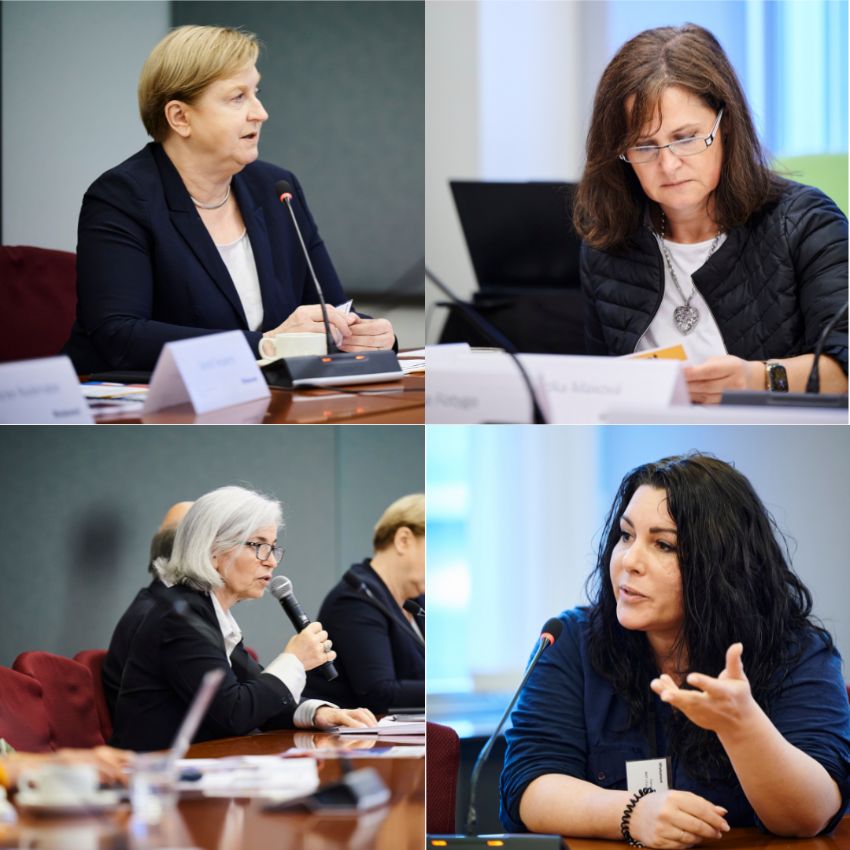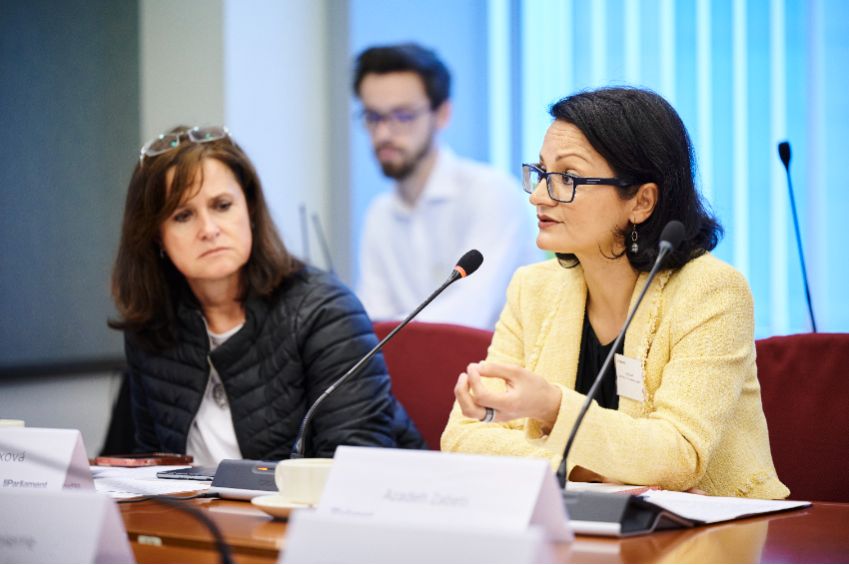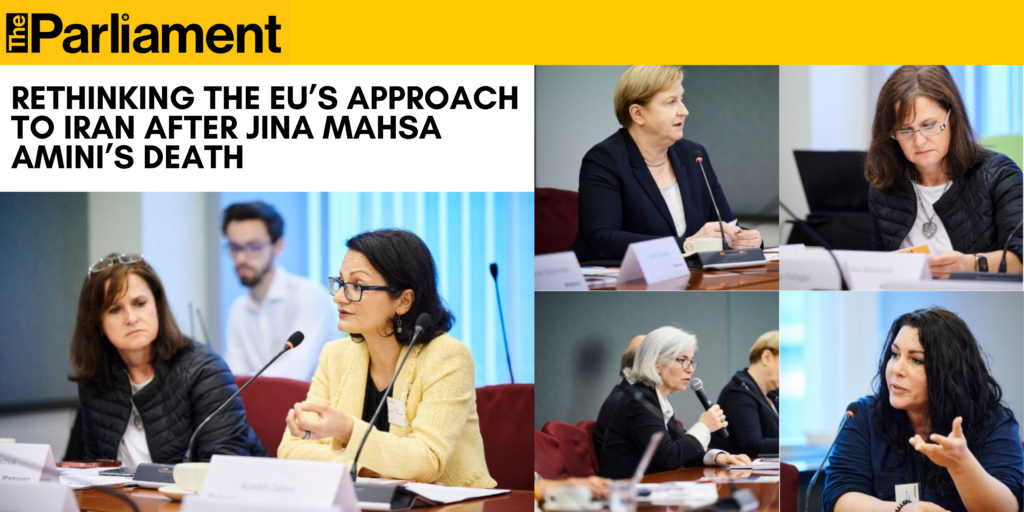Saturday 16 September marked the first anniversary of the death of 22-year-old Jina (Mahsa) Amini. She died in the custody of Iran’s morality police, sparking a wave of protests across the country. Analysts described it as the first women-led uprising in the Islamic Republic.
If it is to be maintained, this historic momentum requires support from the European Union and the international community in the form of policies that address the Iranian government’s repression and gross human rights violations, as well as the disastrous socioeconomic situation in the country.
These were the major takeaways of the event, One Year After Jina Mahsa Amini’s Death: The Situation in Iran, held in the European Parliament on 21 September in partnership with the Alliance for Public Awareness.
“Our presence here is not merely symbolic. We are here to show that we are ready to support positive change in Iran,” said MEP Radka Maxová (S&D), the event’s host.
Azadah Zabeti, an international human rights lawyer and co-president of the Committee of Anglo-Iranian Lawyers, told the audience that the scale of the uprising following Amini’s death was evidence of unity among the Iranian people.
“The scope of the uprising is significant, in terms of the numbers and ferocity of people but also in terms of the fact that people from all walks of life, ages, religious and ethnic groups are out on the streets, showing unification in the desire for regime change,” she explained.
Zabeti said the uprising had not begun by chance but was the culmination of 44 years of organised resistance against tyranny by the Iranian people. She noted that protests have been ongoing for decades but are repeatedly suppressed by the regime with brutal violence.
“There is often a misconception in the West and our media, where the current uprising is almost belittled,” she said. “That this uprising was somehow merely to do with Iran’s compulsory dress code would be a huge disservice to the men, women and children who have lost their lives during this rebellion to bring about democratic regime change.”
Gérard Vespierre, founding partner of Strategic Councils and an associate researcher at FEMO, the Foundation for Middle Eastern Studies, told the event that the root cause of the turmoil in Iran is the economic crisis in the country.
Offering an analysis of Iran’s economic challenges, Vespierre said the lack of investment in the domestic economy, such as critical infrastructure, and the poor financial management of the regime, as well as the vast corruption within the ranks of the state, have been impoverishing the nation over the past 44 years, impacting two generations of people eager for regime change.
Oil production, one of the country’s primary resources, has suffered a 30 per cent decrease in production since the Iranian revolution of 1979 – an economic reality on a collision course with the growing population, which has doubled over the same period. “The decline is structural, and the economic situation is really the base that has contributed to the social anger,” observed Vespierre.
While British-Iranian Zabeti agreed the economic situation was a significant factor, she maintained that human rights were at the heart of the Iranian quest for freedom. “Even if we were to take the theory that Iran has the perfect economy, the Iranian people [want] to overthrow the Iranian regime in its entirety and replace it with a free, democratic and secular republic,” she argued.
Iran has faced criticism for its human rights record for decades. References to the latest reports of violent repression against protestors returning to the streets to commemorate Amini’s death triggered a unanimous call for action from the panellists at The Parliament event.

Left to right: MEP Anna Fotyga (ECR, PL), MEP Radka Maxová (S&D, CZ), MEP Dorien Rookmaker (ECR, NL), MEP Theresa Bielowski (S&D, AT).
“Both the regime and its leaders know that their actions and these [recent] malicious executions, among others, have consequences. These responsibilities won’t be forgotten but will be demanded,” said Spanish MEP Javier Zarzalejos (EPP).
Dutch MEP Dorien Rookmaker (ECR) said the regime in Iran sustained its grip on power through acts of terrorism and executions, while actively disseminating false information to demonise alternatives to its theocratic rule, such as the National Council of Resistance of Iran (NCRI) and its most active member, the MEK (the People’s Mujahedin of Iran). Rookmaker urged MEPs to exercise caution in their words and actions, and to consider their potential impact on the resistance units and the Iranian populace.
“I call on my colleagues in the EU institutions to consider every action that they take, every speech that they make, every amendment that they file, and to ask themselves: ‘Does it help to establish a democracy in Iran?’” urged Rookmaker. She also voiced her endorsement of Maryam Rajavi, president-elect of the NCRI and creator of a 10-point plan for a free and democratic republic in Iran.
The EU’s response requires a combination of political tools with economic sanctions, said MEP Anna Fotyga (ECR). For the Polish MEP, the current EU stance towards Iran after the signing of the 2015 Joint Comprehensive Plan of Action must be revisited: “Reconciliation done in the spirit of impunity was, and still is, a mistake,” she said.

Fotyga went on to recall her participation at the 2018 NCRI rally in Paris, highlighting statements made by Rajavi and her democratic values for Iran. Fotyga said it was made public that the Iranian Revolutionary Guard were under cover in Europe and planning assassination attempts. “When we talk about peaceful Europe, we need to be aware of potential atrocities perpetrated by these vicious regimes,” Fotyga warned.
There is no doubt that the protests that broke out in September 2022 have changed Iran in significant ways. Although the Islamic Republic has remained in power, Iran is undergoing a civil disobedience revolution but, the political future of the country remains to be seen.
https://www.theparliamentmagazine.eu/news/article/rethinking-the-eus-approach-to-iran-after-jina-mahsa-aminis-death
The @Europarl_EN awarded Jina Mahsa Amini the 2023 Sakharov Prize. MEP’s @AnnaFotyga_P @MaxovaRadka @RookmakerDorien @MuiggTheresa @FZarzalejos joined us to discuss how the can EU rethink its approach to Iran.
Learn more⬇️ https://t.co/XXYFmFOZeQ#partnercontent @APA_ICE pic.twitter.com/q2RWzGSALi
— The Parliament (@Parlimag) November 6, 2023

